tutorial, characters, criticism, study resources
Far from the Madding Crowd (1874) was the first of Hardy’s novels to apply the name of Wessex to the landscape of south west England, and the first to gain him widespread popularity as a novelist. It originally appeared anonymously as a monthly serial in the Cornhill Magazine, and was revised extensively for its first publication in single volume format.
Heroine and estate-owner Bathsheba Everdene is romantically involved with three very different men. The dashing Sergeant Troy, who is handsome but unreliable; Farmer Boldwood, who is honourable but middle-aged; and man-of-the-soil Gabriel Oak, who is worthy and prepared to bide his time. The conflicts between them and the ensuing drama has lots of plot twists plus a rich picture of rural life.
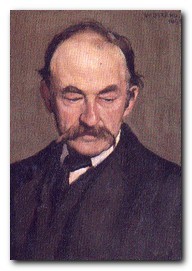
Thomas Hardy is one of the few writers (D.H. Lawrence was another) who made a significant contribution to English literature in the form of the novel, poetry, and the short story. His writing is full of delightful effects, beautiful images and striking language.
He creates unforgettable characters and orchestrates stories which pull at your heart strings. It has to be said that he also relies on coincidences and improbabilities of plot which (though common in the nineteenth century) some people see as weaknesses. However, his sense of drama, his powerful language, and his wonderful depiction of the English countryside make him an enduring favourite.
Far from the Madding Crowd – plot summary
At the beginning of the novel, Bathsheba Everdene is a beautiful young woman without a fortune. She meets Gabriel Oak, a young farmer, and saves his life one evening. He asks her to marry him, but she refuses because she does not love him. Upon inheriting her uncle’s prosperous farm she moves away to the town of Weatherbury.
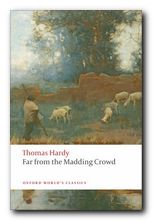 A disaster befalls Gabriel’s farm and he loses his sheep; he is forced to give up farming. He goes looking for work, and in his travels finds himself in Weatherbury. After rescuing a local farm from fire he asks the mistress if she needs a shepherd. It is Bathsheba, and she hires him.
A disaster befalls Gabriel’s farm and he loses his sheep; he is forced to give up farming. He goes looking for work, and in his travels finds himself in Weatherbury. After rescuing a local farm from fire he asks the mistress if she needs a shepherd. It is Bathsheba, and she hires him.
As Bathsheba learns to manage her farm she becomes acquainted with her neighbor, Mr. Boldwood, and on a whim sends him a valentine card with the words “Marry me.” Boldwood becomes obsessed with her and becomes her second suitor. Rich and handsome, he has been sought after by many women. Bathsheba refuses him because she does not love him, but she then agrees to review her decision at some future date.
The same night, Bathsheba meets a handsome soldier, Sergeant Troy. She doesn’t know that he has recently made a local girl, Fanny Robin, pregnant and almost married her. Troy falls in love with Bathsheba, enraging Boldwood. Bathsheba travels to Bath to warn Troy of Boldwood’s anger, and while she is there, Troy persuades her to marry him.
Gabriel Oak has remained her friend throughout and does not approve of the marriage. A few weeks after his marriage to Bathsheba, Troy sees Fanny, poor and sick; she later dies giving birth to their child. Bathsheba discovers that Troy is the father. Grief-stricken at Fanny’s death and riddled with shame, Troy runs away and is thought to have drowned.
With Troy supposedly dead, Boldwood becomes more and more emphatic about marrying Bathsheba. Troy sees Bathsheba at a fair and decides to return to her. Boldwood holds a Christmas party, to which he invites Bathsheba and again proposes marriage. Just after she has agreed, Troy arrives to claim her. Bathsheba screams, and Boldwood shoots Troy dead. He is sentenced to life in prison. A few months later, Bathsheba marries Gabriel, who has become a prosperous bailiff.
Study resources
![]() Far from the Madding Crowd – Oxford World Classics – Amazon UK
Far from the Madding Crowd – Oxford World Classics – Amazon UK
![]() Far from the Madding Crowd – Oxford World Classics – Amazon US
Far from the Madding Crowd – Oxford World Classics – Amazon US
![]() Far from the Madding Crowd – Wordsworth Classics – Amazon UK
Far from the Madding Crowd – Wordsworth Classics – Amazon UK
![]() Far from the Madding Crowd – Wordsworth Classics – Amazon US
Far from the Madding Crowd – Wordsworth Classics – Amazon US
![]() Far from the Madding Crowd – Penguin Classics – Amazon UK
Far from the Madding Crowd – Penguin Classics – Amazon UK
![]() Far from the Madding Crowd – Penguin Classics – Amazon UK
Far from the Madding Crowd – Penguin Classics – Amazon UK
![]() Far from the Madding Crowd – Kindle eBook version
Far from the Madding Crowd – Kindle eBook version
![]() Far from the Madding Crowd – York Notes – Amazon UK
Far from the Madding Crowd – York Notes – Amazon UK
![]() Far from the Madding Crowd – Brodie’s Notes – Amazon UK
Far from the Madding Crowd – Brodie’s Notes – Amazon UK
![]() Far from the Madding Crowd – 1967 film version on DVD – Amazon UK
Far from the Madding Crowd – 1967 film version on DVD – Amazon UK
![]() Far from the Madding Crowd – audioBook version – Amazon UK
Far from the Madding Crowd – audioBook version – Amazon UK
![]() Far from the Madding Crowd – audioBook version at LibriVox
Far from the Madding Crowd – audioBook version at LibriVox
![]() Far from the Madding Crowd – eBook versions at Gutenberg
Far from the Madding Crowd – eBook versions at Gutenberg
![]() Thomas Hardy: A Biography – definitive study – Amazon UK
Thomas Hardy: A Biography – definitive study – Amazon UK
![]() The Cambridge Companion to Thomas Hardy – Amazon UK
The Cambridge Companion to Thomas Hardy – Amazon UK
![]() The Complete Critical Guide to Thomas Hardy – Amazon UK
The Complete Critical Guide to Thomas Hardy – Amazon UK
![]() Authors in Context – Thomas Hardy – Amazon UK
Authors in Context – Thomas Hardy – Amazon UK
![]() Oxford Reader’s Companion to Hardy – Amazon UK
Oxford Reader’s Companion to Hardy – Amazon UK
Film version
John Schlesinger’s film adaptation (1967) has an outstanding sound track by Richard Rodney Bennett, and stalwart performances from an all star cast of Julie Christie as Bathsheba, Alan Bates as Gabriel Oak, Terence Stamp as Sergeant Troy, and Peter Finch as Boldwood – plus delicious a country bumpkin role for Freddy Jones. The film was shot by now-director Nicolas Roeg (Don’t Look Now and Bad Timing) and the screenplay was written by novelist Frederic Raphael. This film is a visual treat which has stood the test of time.
![]() See reviews of the film at the Internet Movie Database
See reviews of the film at the Internet Movie Database
Principal characters
| Gabriel Oak | a young and loyal farmer |
| Bathsheba Everdene | young woman who inherits a farm |
| Sargeant Frank Troy | handsome and dashing young soldier |
| William Boldwood | well-to-do farm owner |
| Fanny Robin | a poor orphan servant girl |
| Joseph Poorgrass | a timid farm labourer |
| Pennyways | a bailiff on Bathsheba’s farm |
Far from the Madding Crowd – title
Hardy took the title for his novel from Thomas Gray’s poem Elegy Written in a Country Churchyard (1751):
Far from the madding crowd’s ignoble strife
Their sober wishes never learn’d to stray;
Along the cool sequester’d vale of life
They kept the noiseless tenor of their way.
The title is often mis-quoted as ‘Far from the Maddening Crowd’ – though interestingly, both words mean the same thing.
Hardy’s WESSEX
Further reading
![]() J.O. Bailey, The Poetry of Thomas Hardy: A Handbook and Commentary, Chapel Hill:N.C., 1970.
J.O. Bailey, The Poetry of Thomas Hardy: A Handbook and Commentary, Chapel Hill:N.C., 1970.
![]() John Bayley, An Essay on Hardy, Cambridge: Cambridge University Press, 1978.
John Bayley, An Essay on Hardy, Cambridge: Cambridge University Press, 1978.
![]() Penny Boumelha, Thomas Hardy and Women: Sexual Ideology and Narrative Form, Brighton: Harvester, 1982.
Penny Boumelha, Thomas Hardy and Women: Sexual Ideology and Narrative Form, Brighton: Harvester, 1982.
![]() Kristin Brady, The Short Stories of Thomas Hardy, London: Macmillan, 1982.
Kristin Brady, The Short Stories of Thomas Hardy, London: Macmillan, 1982.
![]() L. St.J. Butler, Alternative Hardy, London: Macmillan, 1989.
L. St.J. Butler, Alternative Hardy, London: Macmillan, 1989.
![]() Raymond Chapman, The Language of Thomas Hardy, London: Macmillan, 1990.
Raymond Chapman, The Language of Thomas Hardy, London: Macmillan, 1990.
![]() R.G.Cox, Thomas Hardy: The Critical Heritage, London: Routledge and Keegan Paul, 1970.
R.G.Cox, Thomas Hardy: The Critical Heritage, London: Routledge and Keegan Paul, 1970.
![]() Ralph W.V. Elliot, Thomas Hardy’s English, Oxford: Basil Blackwell, 1984.
Ralph W.V. Elliot, Thomas Hardy’s English, Oxford: Basil Blackwell, 1984.
![]() Simon Gattrel, Hardy the Creator: A Textual Biography, Oxford: Clarendon Press, 1988.
Simon Gattrel, Hardy the Creator: A Textual Biography, Oxford: Clarendon Press, 1988.
![]() James Gibson (ed), The Complete Poems of Thomas Hardy, London, 1976.
James Gibson (ed), The Complete Poems of Thomas Hardy, London, 1976.
![]() I. Gregor, The Great Web: The Form of Hardy’s Major Fiction, London: Faber, 1974.
I. Gregor, The Great Web: The Form of Hardy’s Major Fiction, London: Faber, 1974.
![]() Florence Emily Hardy, The Life of Thomas Hardy, London: Macmillan, 1962. (This is more or less Hardy’ s autobiography, since he told his wife what to write.)
Florence Emily Hardy, The Life of Thomas Hardy, London: Macmillan, 1962. (This is more or less Hardy’ s autobiography, since he told his wife what to write.)
![]() P. Ingham, Thomas Hardy: A Feminist Reading, Brighton: Harvester, 1989.
P. Ingham, Thomas Hardy: A Feminist Reading, Brighton: Harvester, 1989.
![]() P.Ingham, The Language of Class and Gender: Transformation in the English Novel, London: Routledge, 1995,
P.Ingham, The Language of Class and Gender: Transformation in the English Novel, London: Routledge, 1995,
![]() D. Kramer, Thomas Hardy: The Forms of Tragedy, London: Macmillan, 1975.
D. Kramer, Thomas Hardy: The Forms of Tragedy, London: Macmillan, 1975.
![]() J. Hillis Miller, Thomas Hardy: Distance and Desire, Cambridge: Harvard University Press, 1970.
J. Hillis Miller, Thomas Hardy: Distance and Desire, Cambridge: Harvard University Press, 1970.
![]() Michael Millgate, Thomas Hardy: His Career as a Novelist, London: Bodley Head, 1971.
Michael Millgate, Thomas Hardy: His Career as a Novelist, London: Bodley Head, 1971.
![]() Michael Millgate, Thomas Hardy: A Biography Revisited, Oxford: Clarendon Press, 2006. (This is the definitive biography.)
Michael Millgate, Thomas Hardy: A Biography Revisited, Oxford: Clarendon Press, 2006. (This is the definitive biography.)
![]() Michael Millgate and Richard L. Purdy (eds), The Collected Letters of Thomas Hardy, Oxford: Clarendon Press, 1978-
Michael Millgate and Richard L. Purdy (eds), The Collected Letters of Thomas Hardy, Oxford: Clarendon Press, 1978-
![]() R. Morgan, Women and Sexuality in the Novels of Thomas Hardy, London: Routledge, 1988.
R. Morgan, Women and Sexuality in the Novels of Thomas Hardy, London: Routledge, 1988.
![]() Harold Orel (ed), Thomas Hardy’s Personal Writings, London, 1967.
Harold Orel (ed), Thomas Hardy’s Personal Writings, London, 1967.
![]() Norman Page, Thomas Hardy: The Novels, London: Macmillan, 2001.
Norman Page, Thomas Hardy: The Novels, London: Macmillan, 2001.
![]() F.B. Pinion, A Thomas Hardy Companion, London: Macmillan, 1968.
F.B. Pinion, A Thomas Hardy Companion, London: Macmillan, 1968.
![]() F.B. Pinion, A Thomas Hardy Dictionary, New York: New York University Press, 1989.
F.B. Pinion, A Thomas Hardy Dictionary, New York: New York University Press, 1989.
![]() Richard L. Purdy, Thomas Hardy: A Bibliographical Study, Oxford: Clarendon Press, 1978.
Richard L. Purdy, Thomas Hardy: A Bibliographical Study, Oxford: Clarendon Press, 1978.
![]() Marlene Springer, Hardy’s Use of Allusion, London: Macmillan, 1983.
Marlene Springer, Hardy’s Use of Allusion, London: Macmillan, 1983.
![]() Rosemary Sumner, Thomas Hardy: Psychological Novelist, London: Macmillan, 1981.
Rosemary Sumner, Thomas Hardy: Psychological Novelist, London: Macmillan, 1981.
![]() Richard H. Taylor, The Neglected Hardy: Thomas Hardy’s Lesser Novels, London: Macmillan, 1982.
Richard H. Taylor, The Neglected Hardy: Thomas Hardy’s Lesser Novels, London: Macmillan, 1982.
![]() Richard H. Taylor, The Personal Notebooks of Thomas Hardy, London, 1978.
Richard H. Taylor, The Personal Notebooks of Thomas Hardy, London, 1978.
![]() Merryn Williams, A Preface to Hardy, London: Longman, 1976.
Merryn Williams, A Preface to Hardy, London: Longman, 1976.
Hardy’s study
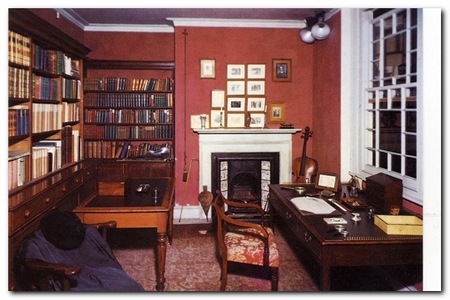
reconstructed in Dorchester museum
Other works by Thomas Hardy
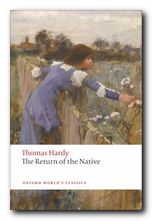 The Return of the Native (1878) It’s often said that this is one of the most Hardyesque of all the novels. There are some stand-out characters: Eustacia Vye, a heroine who patrols the moors looking out for her man through a telescope; Clym Yeobright, a hero who can’t escape his mother’s influence; and Diggory Ven, an itinerant trader who wanders in and out of the story covered in red dye. Improbable coincidences and dramatic ironies abound – and over it all presides the brooding presence of Egdon Heath. But underneath the melodrama, there are profound psychological forces at work. You need to be patient. This is one for Hardy enthusiasts – not beginners. This edition, unlike any other currently available, retains the text of the novel’s first edition, without the later changes that substantially altered Hardy’s original intentions.
The Return of the Native (1878) It’s often said that this is one of the most Hardyesque of all the novels. There are some stand-out characters: Eustacia Vye, a heroine who patrols the moors looking out for her man through a telescope; Clym Yeobright, a hero who can’t escape his mother’s influence; and Diggory Ven, an itinerant trader who wanders in and out of the story covered in red dye. Improbable coincidences and dramatic ironies abound – and over it all presides the brooding presence of Egdon Heath. But underneath the melodrama, there are profound psychological forces at work. You need to be patient. This is one for Hardy enthusiasts – not beginners. This edition, unlike any other currently available, retains the text of the novel’s first edition, without the later changes that substantially altered Hardy’s original intentions.
![]() Buy the book at Amazon UK
Buy the book at Amazon UK
![]() Buy the book at Amazon US
Buy the book at Amazon US
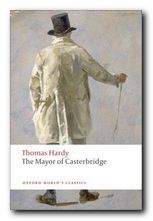 The Mayor of Casterbridge (1886) is probably Hardy’s greatest work – a novel whose aspirations are matched by artistic shaping and control. It is the tragic history of Michael Henchard – a man who rises to civic prominence, but whose past comes back to haunt him. This is not surprising, because he sells his wife in the opening chapter. When she comes back unexpectedly, he is trapped between present and past. He is also locked into a psychological contest with an alter-ego figure with whom he battles both metaphorically and realistically. Henchard falls in the course of the novel from civic honour and commercial greatness into a tragic figure, a man defeated by his own strengths as much as his weaknesses. There are strong echoes of King Lear here, and some of the most dramatic and psychologically revealing scenes in all of Hardy’s work.
The Mayor of Casterbridge (1886) is probably Hardy’s greatest work – a novel whose aspirations are matched by artistic shaping and control. It is the tragic history of Michael Henchard – a man who rises to civic prominence, but whose past comes back to haunt him. This is not surprising, because he sells his wife in the opening chapter. When she comes back unexpectedly, he is trapped between present and past. He is also locked into a psychological contest with an alter-ego figure with whom he battles both metaphorically and realistically. Henchard falls in the course of the novel from civic honour and commercial greatness into a tragic figure, a man defeated by his own strengths as much as his weaknesses. There are strong echoes of King Lear here, and some of the most dramatic and psychologically revealing scenes in all of Hardy’s work.
![]() Buy the book at Amazon UK
Buy the book at Amazon UK
![]() Buy the book at Amazon US
Buy the book at Amazon US
Thomas Hardy – web links
![]() Thomas Hardy at Mantex
Thomas Hardy at Mantex
Biographical notes, study guides to the major novels, book reviews. bibliographies, critiques of the shorter fiction, and web links.
![]() The Thomas Hardy Collection
The Thomas Hardy Collection
The complete novels, stories, and poetry – Kindle eBook single file download for £1.29 at Amazon.
![]() Thomas Hardy at Project Gutenberg
Thomas Hardy at Project Gutenberg
A major collection of free eTexts in a variety of digital formats.
![]() Thomas Hardy at Wikipedia
Thomas Hardy at Wikipedia
Biographical notes, social background, the novels and literary themes, poetry, religious beliefs and influence, biographies and criticism.
![]() The Thomas Hardy Society
The Thomas Hardy Society
Dorset-based site featuring educational activities, a biennial conference, a journal (three times a year) with links to the texts of all the major works.
![]() The Thomas Hardy Association
The Thomas Hardy Association
American-based site with photos and academic resources. Be prepared to search and drill down to reach the more useful materials.
![]() Thomas Hardy on the Internet Movie Database
Thomas Hardy on the Internet Movie Database
Adaptations for the cinema and television – in various languages. Full details of directors, actors, production features, box office, film reviews, and even quizzes.
![]() Thomas Hardy – online literary criticism
Thomas Hardy – online literary criticism
Small collection of academic papers and articles ‘favoring signed articles by recognized scholars and articles published in peer-reviewed sources’.
![]() Thomas Hardy’s Wessex
Thomas Hardy’s Wessex
Evolution of Wessex, contemporary reviews, maps, bibliography, links to other web sites, and history.
© Roy Johnson 2010
More on Thomas Hardy
More on the novella
More on literary studies
More on short stories
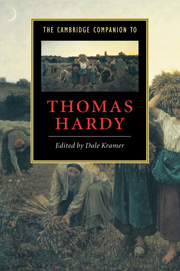
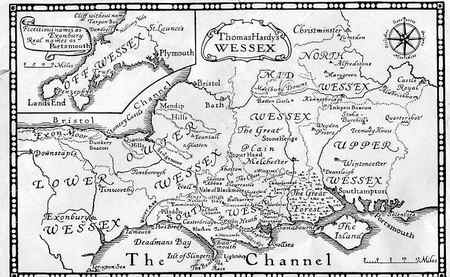
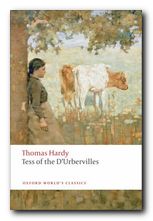 Tess of the d’Urbervilles
Tess of the d’Urbervilles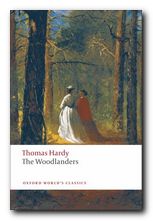 The Woodlanders
The Woodlanders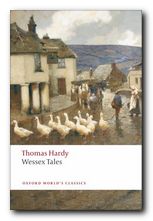 Wessex Tales
Wessex Tales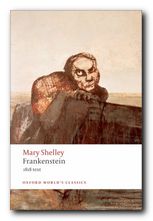
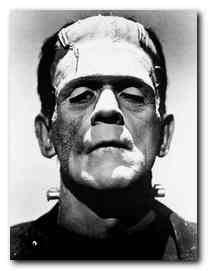 Another common feature of the romantic hero is shared by Walton, Frankenstein, and the Monster. All of them are powerful egoists who claim that their sensitivity and suffering is greater than that of others. Walton claims that he is different from ordinary mortals because of his solitary self-education, but he puts it in typically self-aggrandising form: ‘I have thought more, and … my day dreams are more extended and magnificent’.
Another common feature of the romantic hero is shared by Walton, Frankenstein, and the Monster. All of them are powerful egoists who claim that their sensitivity and suffering is greater than that of others. Walton claims that he is different from ordinary mortals because of his solitary self-education, but he puts it in typically self-aggrandising form: ‘I have thought more, and … my day dreams are more extended and magnificent’.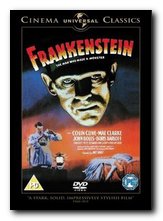 Following Frankenstein’s rescue by his father (a late rallying of the Super-Ego) he can put off his marriage no longer: ‘My father … talked of … Elizabeth … but these words only drew deep groans from me’. But his Ego cannot face the sexual consequence of the marriage: the Id takes his place instead, but having now become a permanently negative force the result is that combination of sexuality and death which the Id represents. The Ego politely leaves the bed chamber to let the Id do its work, the outcome of which is represented in unmistakably sexual terms:
Following Frankenstein’s rescue by his father (a late rallying of the Super-Ego) he can put off his marriage no longer: ‘My father … talked of … Elizabeth … but these words only drew deep groans from me’. But his Ego cannot face the sexual consequence of the marriage: the Id takes his place instead, but having now become a permanently negative force the result is that combination of sexuality and death which the Id represents. The Ego politely leaves the bed chamber to let the Id do its work, the outcome of which is represented in unmistakably sexual terms: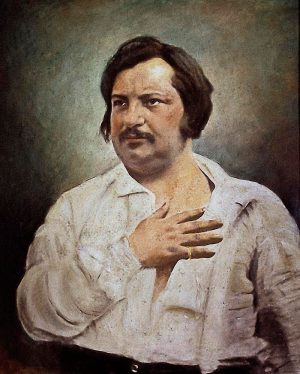
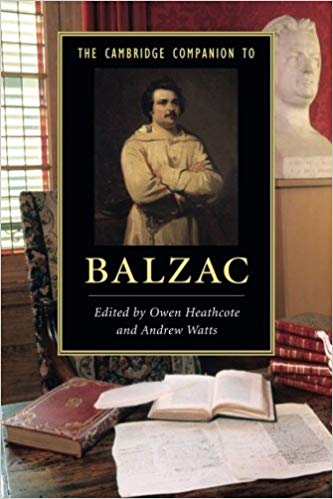
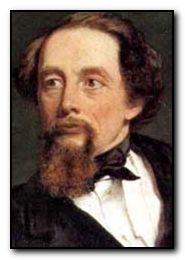
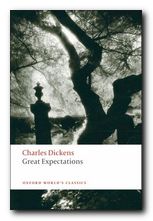 During Christmas dinner, whilst Pip is scared that someone will notice the missing pie. Police officers arrive and hunt through the marshes outside the village for escaped convicts. They accost the man helped by Pip, but when questioned about where he got the food and file, he claims he stole the items himself. The police take him off to the Hulk, a giant prison ship.
During Christmas dinner, whilst Pip is scared that someone will notice the missing pie. Police officers arrive and hunt through the marshes outside the village for escaped convicts. They accost the man helped by Pip, but when questioned about where he got the food and file, he claims he stole the items himself. The police take him off to the Hulk, a giant prison ship.
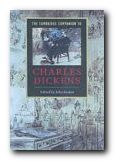 The Cambridge Companion to Charles Dickens contains fourteen essays which cover the whole range of Dickens’s writing, from Sketches by Boz through to The Mystery of Edwin Drood. Some address important thematic topics: childhood, the city, and domestic ideology. Others consider the serial publication and Dickens’s distinctive use of language. Three final chapters examine Dickens in relation to work in other media: illustration, theatre, and film. The volume as a whole offers a valuable introduction to Dickens for students and general readers, as well as fresh insights, informed by recent critical theory.
The Cambridge Companion to Charles Dickens contains fourteen essays which cover the whole range of Dickens’s writing, from Sketches by Boz through to The Mystery of Edwin Drood. Some address important thematic topics: childhood, the city, and domestic ideology. Others consider the serial publication and Dickens’s distinctive use of language. Three final chapters examine Dickens in relation to work in other media: illustration, theatre, and film. The volume as a whole offers a valuable introduction to Dickens for students and general readers, as well as fresh insights, informed by recent critical theory.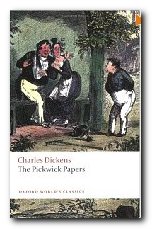 Pickwick Papers (1836-37) was Dickens’ first big success. It was issued in twenty monthly parts and is not so much a novel as a series of loosely linked sketches and changing characters featured in reports to the Pickwick Club. These recount comic excursions to Rochester, Dingley Dell, and Bath; duels and elopements; Christmas festivities; Mr Pickwick inadvertently entering the bedroom of a middle-aged lady at night; and in the end a happy marriage. Much light-hearted fun, and a host of memorable characters.
Pickwick Papers (1836-37) was Dickens’ first big success. It was issued in twenty monthly parts and is not so much a novel as a series of loosely linked sketches and changing characters featured in reports to the Pickwick Club. These recount comic excursions to Rochester, Dingley Dell, and Bath; duels and elopements; Christmas festivities; Mr Pickwick inadvertently entering the bedroom of a middle-aged lady at night; and in the end a happy marriage. Much light-hearted fun, and a host of memorable characters.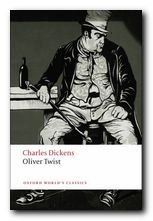 Oliver Twist (1837-38) expresses Dickens’ sense of the vulnerability of children. Oliver is a foundling, raised in a workhouse, who escapes suffering by running off to London. There he falls into the hands of a gang of thieves controlled by the infamous Fagin. He is pursued by the sinister figure of Monks who has secret information about him. The plot centres on the twin issues of personal identity and a secret inheritance (which surface again in Great Expectations). Emigration, prison, and violent death punctuate a cascade of dramatic events. This is the early Victorian novel in fine melodramatic form. Recommended for beginners to Dickens.
Oliver Twist (1837-38) expresses Dickens’ sense of the vulnerability of children. Oliver is a foundling, raised in a workhouse, who escapes suffering by running off to London. There he falls into the hands of a gang of thieves controlled by the infamous Fagin. He is pursued by the sinister figure of Monks who has secret information about him. The plot centres on the twin issues of personal identity and a secret inheritance (which surface again in Great Expectations). Emigration, prison, and violent death punctuate a cascade of dramatic events. This is the early Victorian novel in fine melodramatic form. Recommended for beginners to Dickens.